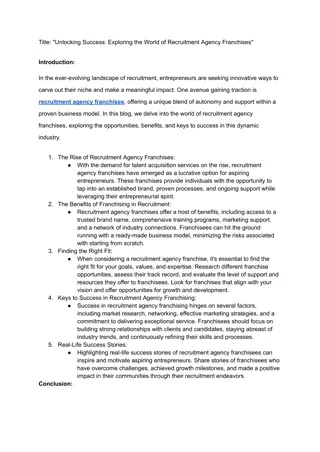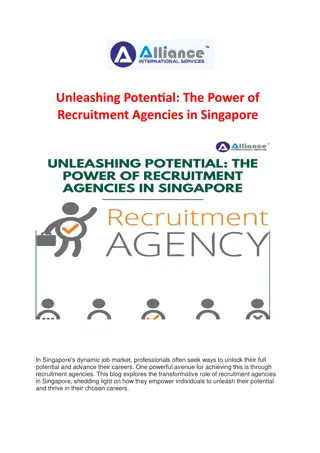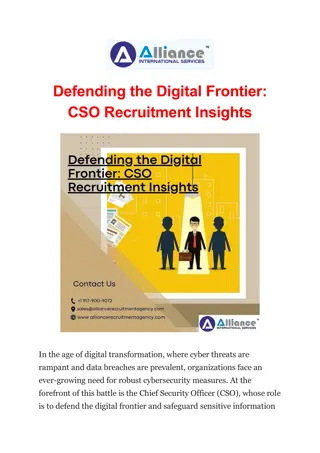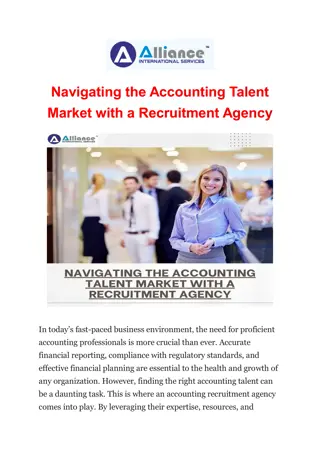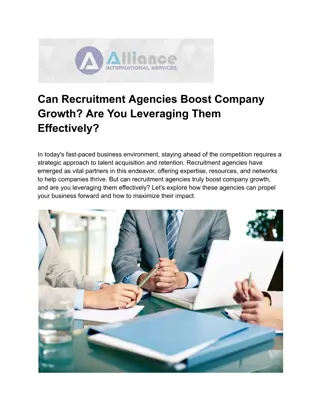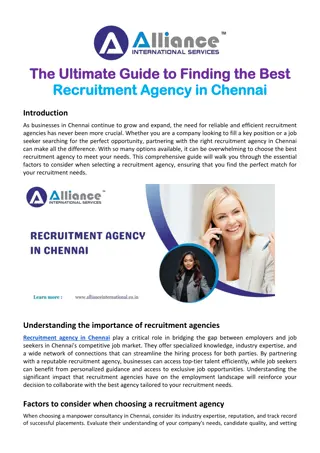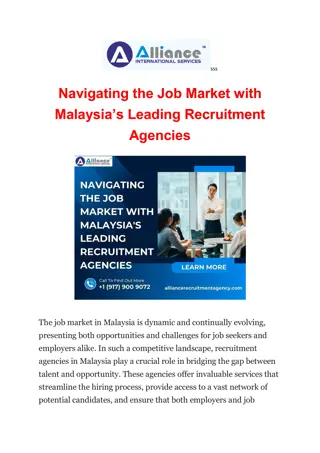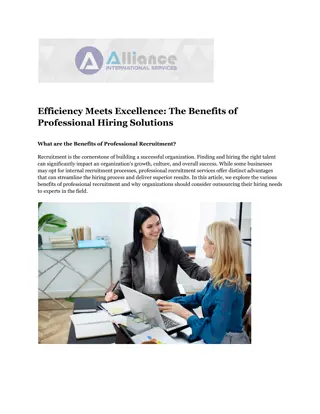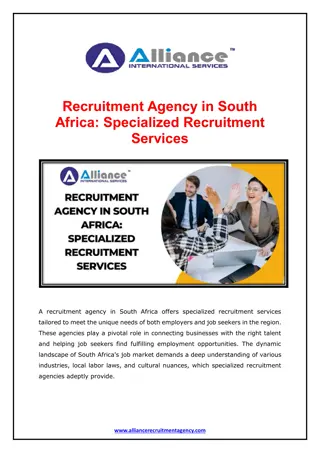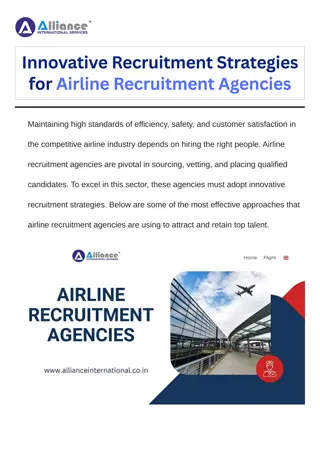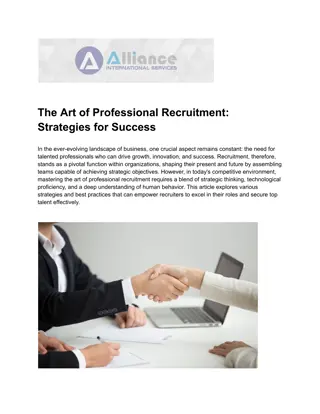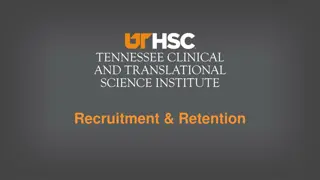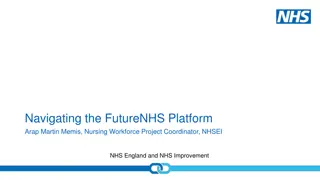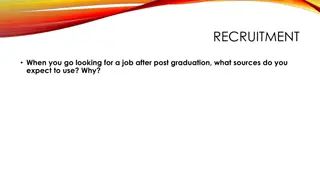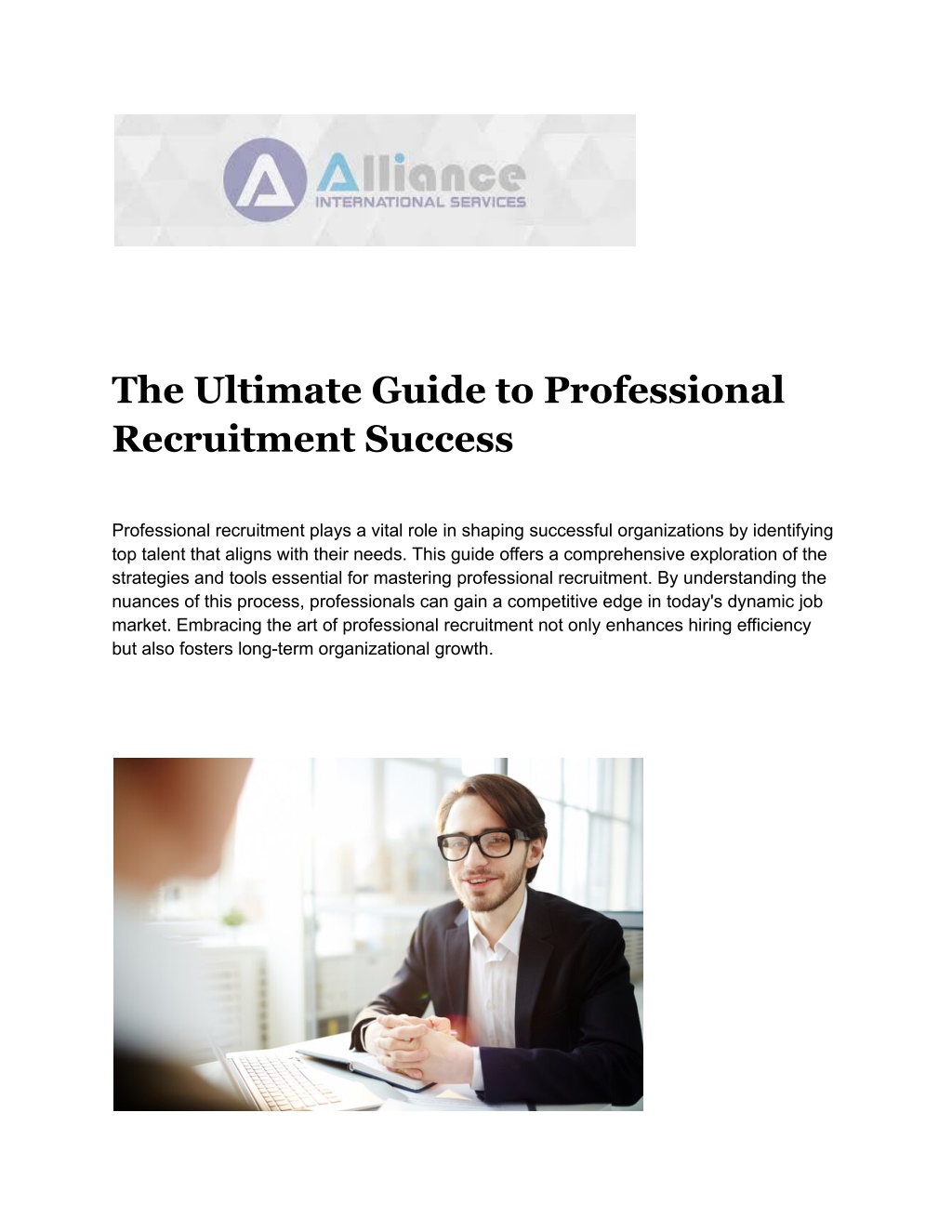
The Ultimate Guide to Professional Recruitment Success
The Ultimate Guide to Professional Recruitment Success" offers essential strategies and insights for effective talent acquisition. Learn industry expertise, innovative approaches, and client-candidate dynamics. Partner with Alliance Recruitment Agency for tailored solutions and superior outcomes.nnFor Information: nVisit: // /professional-recruitment/
Download Presentation

Please find below an Image/Link to download the presentation.
The content on the website is provided AS IS for your information and personal use only. It may not be sold, licensed, or shared on other websites without obtaining consent from the author. If you encounter any issues during the download, it is possible that the publisher has removed the file from their server.
You are allowed to download the files provided on this website for personal or commercial use, subject to the condition that they are used lawfully. All files are the property of their respective owners.
The content on the website is provided AS IS for your information and personal use only. It may not be sold, licensed, or shared on other websites without obtaining consent from the author.
E N D
Presentation Transcript
The Ultimate Guide to Professional Recruitment Success Professional recruitment plays a vital role in shaping successful organizations by identifying top talent that aligns with their needs. This guide offers a comprehensive exploration of the strategies and tools essential for mastering professional recruitment. By understanding the nuances of this process, professionals can gain a competitive edge in today's dynamic job market. Embracing the art of professional recruitment not only enhances hiring efficiency but also fosters long-term organizational growth.
Understanding Professional Recruitment In the realm of professional recruitment, the process involves a meticulous approach to identifying individuals who possess the skills and qualities that organizations seek. This section delves into the core aspects that define professional recruitment and its significance in today's competitive landscape. Definition and Scope What is Professional Recruitment? Professional recruitment encompasses the strategic methodology employed by organizations to attract, assess, and select candidates for key positions within their workforce. It involves a systematic evaluation of candidates' qualifications, experience, and cultural fit to ensure optimal alignment with the organization's objectives. Scope of Professional Recruitment The scope of professional recruitment extends beyond mere talent acquisition. It encompasses a holistic approach to workforce planning, talent management, and organizational development. By focusing on long-term strategic goals, professional recruitment aims to cultivate a pool of top-tier professionals who can drive innovation, productivity, and sustainable growth within an organization. Importance in Today's Market Market Demands In today's dynamic market environment, the demand for skilled professionals continues to escalate across various industries. Organizations are increasingly competing to secure top talent capable of navigating complex challenges and driving business success. As such, mastering the art of professional recruitment is imperative for staying ahead in a fiercely competitive job market. Competitive Advantage Adeptness in professional recruitment confers a significant competitive advantage upon organizations seeking to thrive in today's business landscape. By strategically identifying and engaging top talent, companies can enhance their operational efficiency, foster innovation, and maintain a robust position in the market. The ability to attract and retain high-caliber professionals through effective professional recruitment practices serves as a cornerstone for sustained success. Key Strategies for Success In the realm of professional recruitment, mastering key strategies is paramount to achieving success in talent acquisition and organizational growth. By implementing effective techniques for identifying top talent, building robust relationships, and fostering continuous improvement, professionals can elevate their recruitment practices to new heights.
Identifying Talent Effective Sourcing Techniques To kickstart the talent identification process, organizations must leverage a diverse range of sourcing techniques to attract a pool of qualified candidates. This involves tapping into various channels such as job boards, social media platforms, and professional networking sites to cast a wide net and reach potential candidates across different demographics and skill sets. Screening and Selection Once a pool of candidates is sourced, the screening and selection phase plays a pivotal role in identifying individuals who align with the organization's values and requirements. Through meticulous evaluation of resumes, interviews, and assessments, recruiters can pinpoint candidates with the right blend of skills, experience, and cultural fit essential for success within the organization. Building Relationships Employer Branding Establishing a strong employer brand is instrumental in attracting top-tier talent to an organization. By showcasing a compelling narrative that highlights the company's culture, values, and opportunities for growth, employers can create a magnetizing effect that resonates with potential candidates seeking meaningful career experiences. Candidate Experience Providing a seamless and positive candidate experience is key to fostering lasting relationships with prospective hires. From initial contact to onboarding, organizations must prioritize clear communication, transparency, and personalized interactions to ensure that candidates feel valued and engaged throughout the recruitment process. Continuous Improvement Feedback Mechanisms Integrating feedback mechanisms into the recruitment process enables organizations to gather valuable insights from candidates and internal stakeholders. By soliciting feedback on the recruitment experience, companies can identify areas for enhancement, refine their processes, and deliver an exceptional candidate journey that sets them apart in the competitive landscape. Training and Development Investing in ongoing training and development programs for recruiters is essential for staying abreast of industry trends, best practices, and emerging technologies in
professional recruitment. By equipping recruiters with the necessary tools and knowledge base, organizations can enhance their capabilities in sourcing top talent effectively while adapting to evolving market demands. Tools and Technologies Recruitment Software In the realm of professional recruitment, leveraging advanced recruitment software is paramount for enhancing efficiency and optimizing talent acquisition processes. Applicant Tracking Systems (ATS) serve as a cornerstone tool that enables organizations to streamline candidate sourcing, screening, and selection. By automating the tracking of applicant data and interactions, recruiters can manage the recruitment pipeline effectively and identify top talent efficiently. Additionally, Customer Relationship Management (CRM) Tools play a pivotal role in nurturing relationships with candidates throughout the recruitment journey. These tools facilitate personalized communication, track candidate interactions, and maintain a centralized database of candidate information for future reference. Data Analytics The integration of data analytics into professional recruitment practices empowers organizations to make informed decisions based on actionable insights derived from vast datasets. Predictive Analytics offers a forward-thinking approach by forecasting future trends in talent acquisition, identifying potential hiring needs, and assessing candidate suitability proactively. By harnessing predictive models, recruiters can anticipate talent gaps, optimize recruitment strategies, and align hiring efforts with organizational objectives effectively. Furthermore, Performance Metrics provide valuable benchmarks for evaluating the effectiveness of recruitment initiatives and measuring key performance indicators. Analyzing metrics such as time-to-fill ratios, cost-per-hire, and retention rates enables organizations to refine their recruitment strategies, enhance operational efficiency, and drive continuous improvement in talent acquisition processes. Social Media and Networking In today's digital age, social media platforms have emerged as indispensable tools for engaging with candidates, promoting employer brand visibility, and expanding professional networks. LinkedIn stands out as a premier platform for connecting with industry professionals, sharing job opportunities, and showcasing organizational culture to a global audience. By leveraging LinkedIn's robust features such as targeted job postings and networking groups, recruiters can establish meaningful connections with top talent and cultivate a strong online presence within the professional community. Moreover,Social Media Strategies encompass a diverse range of tactics aimed at maximizing brand exposure across various social channels. From creating compelling content to engaging
with followers in real-time conversations, effective social media strategies enable organizations to attract passive candidates actively seeking new career opportunities. Common Pitfalls and Solutions When engaging in professional recruitment, it is crucial to navigate common pitfalls effectively to ensure successful talent acquisition. By addressing challenges such as bias, managing expectations, and upholding legal and ethical standards, organizations can streamline their recruitment processes and attract top-tier candidates seamlessly. Avoiding Bias Unconscious Bias Training Implementing unconscious bias training equips recruiters with the necessary tools to recognize and mitigate implicit biases that may influence decision-making during the recruitment process. By fostering awareness of unconscious prejudices and stereotypes, organizations can promote fair and equitable candidate evaluation, leading to more inclusive hiring practices. Structured Interviews Utilizing structured interviews offers a systematic approach to assessing candidates based on predetermined criteria relevant to the role. By standardizing interview questions and evaluation methods, recruiters can minimize subjective judgments and ensure a consistent candidate assessment process. Structured interviews enhance objectivity in candidate evaluations, enabling organizations to focus on merit-based selection decisions. Managing Expectations Clear Communication Maintaining clear communication channels throughout the recruitment journey is essential for managing candidate expectations effectively. By providing transparent information regarding job roles, responsibilities, and selection timelines, organizations can establish trust with candidates and align mutual expectations. Clear communication fosters a positive candidate experience, ensuring that individuals are well-informed at every stage of the recruitment process. Setting Realistic Goals Setting realistic goals in professional recruitment involves defining achievable outcomes aligned with organizational objectives. By establishing clear benchmarks for candidate qualifications, cultural fit, and performance expectations, recruiters can streamline the selection process and identify candidates who meet predefined criteria. Setting realistic goals enables organizations to focus on recruiting individuals who contribute meaningfully to the company's success.
Legal and Ethical Considerations Compliance with Laws Adhering to legal regulations governing professional recruitment is paramount for ensuring compliance with anti-discrimination laws, data privacy regulations, and employment standards. Organizations must stay informed about legal requirements related to candidate screening, interviewing practices, and offer negotiations to avoid potential legal liabilities. Compliance with laws safeguards both candidates' rights and organizational interests throughout the recruitment process. Ethical Recruitment Practices Upholding ethical standards in professional recruitment entails conducting all activities with integrity, honesty, and respect for all stakeholders involved. Organizations should prioritize fairness, confidentiality, and professionalism in their interactions with candidates to build trust and credibility within the industry. Ethical recruitment practices not only enhance organizational reputation but also foster long-term relationships based on mutual respect and transparency. In conclusion, achieving professional recruitment success requires a strategic blend of industry expertise, innovative approaches, and a deep understanding of both client needs and candidate aspirations. By leveraging the right resources and employing best practices, organizations can navigate the intricate landscape of talent acquisition with efficiency and effectiveness. Furthermore, partnering with a trusted staffing solution provider like Alliance Recruitment Agency can significantly enhance recruitment outcomes. With their comprehensive suite of services, tailored solutions, and commitment to excellence, Alliance Recruitment Agency stands as a reliable ally in the pursuit of top-tier talent acquisition and workforce optimization. To explore how Alliance Recruitment Agency can assist in your recruitment needs, please feel free to contact us Today. Let us collaborate to drive your organization towards greater success through superior staffing solutions.





